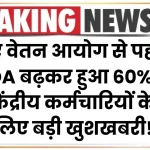
The Senior Citizen Savings Scheme (SCSS) is one of the safest and most rewarding government-backed investment options available to individuals aged 60 years and above. If you’re wondering how to invest in SCSS and how much return senior citizens can earn, this guide breaks down everything you need to know—from eligibility and interest rates to how much you can actually earn over the years.
For many retirees in India, a steady income post-retirement is crucial. The Senior Citizen Savings Scheme by India Post and authorized banks is designed to provide exactly that—a secure source of quarterly income with a high interest rate and government guarantee. Whether you’re a recently retired individual or helping your parents plan their finances, this article will help you make informed, confident choices.
Senior Citizen Savings Scheme (SCSS)
| Feature | Details |
|---|---|
| Interest Rate (April–June 2025) | 8.2% per annum (revised quarterly) |
| Investment Amount | Min: ₹1,000; Max: ₹30 lakh (in multiples of ₹1,000) |
| Maturity Period | 5 years (extendable by 3 years) |
| Interest Payout | Paid quarterly to the linked account |
| Eligible Age | 60+ years (55+ for VRS and retired defense personnel under conditions) |
| Tax Benefit | Deduction under Section 80C (up to ₹1.5 lakh); interest is taxable |
| Where to Invest | Post Office or authorized banks like SBI, HDFC, ICICI, etc. |
| Official Website | India Post |
The Senior Citizen Savings Scheme (SCSS) is a trustworthy, high-return, low-risk investment option for Indian retirees. With a current interest rate of 8.2% per annum, quarterly payouts, and tax benefits under Section 80C, it stands as a pillar of financial stability for senior citizens.
Whether you’re planning your own retirement or assisting a loved one, SCSS deserves serious consideration. Start early, understand the rules, and enjoy a worry-free retirement.
What is Senior Citizen Savings Scheme and Why Is It Important for Senior Citizens?
The Senior Citizen Savings Scheme was launched by the Government of India to offer a safe investment option for individuals over 60, ensuring financial independence during retirement years. Unlike volatile market-linked instruments, Senior Citizen Savings Scheme guarantees returns and is backed by the Central Government, making it virtually risk-free.
It’s particularly valuable because:
- The interest rate (currently 8.2%) is higher than most bank FDs.
- Returns are paid every quarter, offering regular income.
- It’s accessible across post offices and banks across India.
see also: Easy Way to Get ₹3.56 Lakh from Post Office in 5 Years
Who is Eligible to Invest in Senior Citizen Savings Scheme?
You can open an Senior Citizen Savings Scheme account if:
- You are 60 years or older.
- You are 55-60 years old and retired under Voluntary Retirement Scheme (VRS).
- You are defense personnel retired between 50 to 60 years (subject to conditions).
Note: You must open the account within one month of receiving retirement benefits if you are applying before 60.
How to Open an Senior Citizen Savings Scheme Account
Step 1: Choose Your Investment Channel
You can open an Senior Citizen Savings Scheme account at:
- Your nearest Post Office.
- Any authorized bank like SBI, ICICI, HDFC, Punjab National Bank, etc.
Tip: If you’re already a savings account holder with one of these banks, you can easily link your SCSS account for automated interest credit.
Step 2: Collect Required Documents
You’ll need:
- PAN card
- Aadhaar card (identity & address proof)
- Age proof (birth certificate, PAN, or school certificate)
- 2 passport-size photos
- Retirement proof (if applying below 60)
Step 3: Fill and Submit Form A
- Ask for Form A at the branch or download from India Post Forms.
- Fill out the details carefully.
- Nominate someone to receive the funds in case of your demise.
Step 4: Deposit the Amount
You can invest:
- Minimum: ₹1,000
- Maximum: ₹30 lakh (in multiples of ₹1,000)
Payment can be made by cash (up to ₹1 lakh) or cheque.
How Much Return Will You Get From SCSS?
The SCSS interest rate as of April to June 2025 is 8.2% per annum, paid quarterly.
Example 1: Investment of ₹10 Lakh
- Annual Interest: ₹82,000
- Quarterly Payout: ₹20,500
- Total in 5 Years: ₹4,10,000 (excluding compounding)
Example 2: Investment of ₹30 Lakh
- Annual Interest: ₹2,46,000
- Quarterly Payout: ₹61,500
- Total in 5 Years: ₹12,30,000
Note: Interest is taxable as per your income slab.
Can You Extend the Scheme After 5 Years?
Yes. You can extend your SCSS account for 3 more years by applying through Form B within one year of maturity.
- The interest rate applicable at the time of extension will continue during the extended period.
- No additional deposits can be made after the initial investment.
SCSS vs Bank FD: Which Is Better for Seniors?
| Feature | SCSS | Bank FD (Senior Citizen) |
|---|---|---|
| Interest Rate | 8.2% (Q1 FY25) | 7.0% – 7.75% |
| Tenure | 5 years | Flexible |
| Interest Payout | Quarterly | Monthly/Quarterly/Yearly |
| Tax Deduction | 80C | 80C |
| Tax on Interest | Taxable | Taxable |
Verdict: SCSS usually offers better returns with similar tax benefits, and is a great low-risk choice for retirees.
Important Rules to Remember
Premature Closure
- Allowed after 1 year.
- Penalty:
- 1.5% of deposit if closed before 2 years.
- 1% if closed after 2 years.
Nomination Facility
- You can nominate multiple persons.
- Change or cancel nomination anytime using Form C.
Joint Account Option
- You can open a joint account with your spouse only.
- The primary investor must meet eligibility criteria.
Where to Get SCSS Application Forms & Updates?
You can visit the official India Post website for:
- SCSS Guidelines
- Downloadable Forms
For latest interest rates, refer to:
- RBI Announcements
- Ministry of Finance Notifications
see also: Savings vs Investing: Do You Know the Difference Between the Two?
Senior Citizen Savings Scheme (SCSS) FAQs
1. Can NRIs invest in SCSS?
No, Non-Resident Indians (NRIs) are not eligible to invest in SCSS.
2. Is TDS deducted on SCSS interest?
Yes, TDS is deducted if interest income exceeds ₹50,000 per year.
3. Can I transfer my SCSS account from one bank/post office to another?
Yes, account transfers are allowed. Submit Form G at your current branch.
4. What happens if the account holder dies?
The nominee or legal heir can claim the amount. No penalty is charged in such cases.
5. Is SCSS better than the Pradhan Mantri Vaya Vandana Yojana (PMVVY)?
Both are excellent schemes. SCSS pays quarterly interest and PMVVY pays monthly. Choose based on your income needs.











